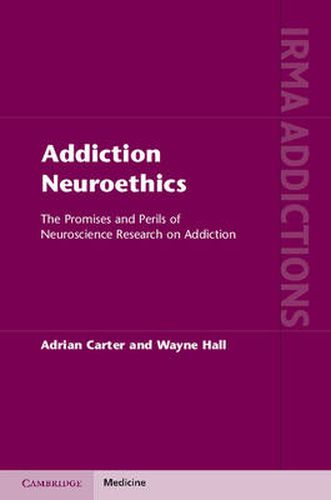Readings Newsletter
Become a Readings Member to make your shopping experience even easier.
Sign in or sign up for free!
You’re not far away from qualifying for FREE standard shipping within Australia
You’ve qualified for FREE standard shipping within Australia
The cart is loading…






Addiction is a significant health and social problem and one of the largest preventable causes of disease globally. Neuroscience promises to revolutionise our ability to treat addiction, lead to recognition of addiction as a ‘real’ disorder in need of medical treatment and thereby reduce stigma and discrimination. However, neuroscience raises numerous social and ethical challenges: * If addicted individuals are suffering from a brain disease that drives them to drug use, should we mandate treatment? * Does addiction impair an individual’s ability to consent to research or treatment? * How will neuroscience affect social policies towards drug use? Addiction Neuroethics addresses these challenges by examining ethical implications of emerging neurobiological treatments, including: novel psychopharmacology, neurosurgery, drug vaccines to prevent relapse, and genetic screening to identify individuals who are vulnerable to addiction. Essential reading for academics, clinicians, researchers and policy-makers in the fields of addiction, mental health and public policy.
$9.00 standard shipping within Australia
FREE standard shipping within Australia for orders over $100.00
Express & International shipping calculated at checkout
Addiction is a significant health and social problem and one of the largest preventable causes of disease globally. Neuroscience promises to revolutionise our ability to treat addiction, lead to recognition of addiction as a ‘real’ disorder in need of medical treatment and thereby reduce stigma and discrimination. However, neuroscience raises numerous social and ethical challenges: * If addicted individuals are suffering from a brain disease that drives them to drug use, should we mandate treatment? * Does addiction impair an individual’s ability to consent to research or treatment? * How will neuroscience affect social policies towards drug use? Addiction Neuroethics addresses these challenges by examining ethical implications of emerging neurobiological treatments, including: novel psychopharmacology, neurosurgery, drug vaccines to prevent relapse, and genetic screening to identify individuals who are vulnerable to addiction. Essential reading for academics, clinicians, researchers and policy-makers in the fields of addiction, mental health and public policy.